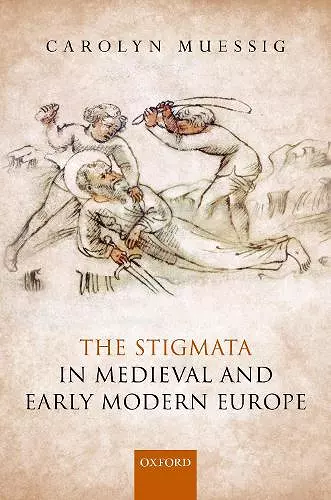The Stigmata in Medieval and Early Modern Europe
Format:Hardback
Publisher:Oxford University Press
Published:6th Feb '20
Currently unavailable, and unfortunately no date known when it will be back

Francis of Assisi's reported reception of the stigmata on Mount La Verna in 1224 is often considered to be the first account of an individual receiving the five wounds of Christ. The thirteenth-century appearance of this miracle, however, is not as unexpected as it first seems. Interpretations of Galatians 6:17-I bear the stigmata of the Lord Jesus Christ in my body-had been circulating in biblical commentaries since late antiquity. These works explained stigmata as wounds that martyrs, like the apostle Paul, received in their attempt to spread Christianity in the face of resistance. By the seventh century, stigmata were described as marks of Christ that priests received invisibly at their ordination. In the eleventh century, monks and nuns were perceived as bearing the stigmata in so far as they lived a life of renunciation out of love for Christ. By the later Middle Ages, women (such as Catherine of Siena) were described as having stigmata more frequently than were men. With the religious upheavals of the sixteenth century, the way stigmata were defined reflected the diverse perceptions of Christianity held by Catholics and Protestants.
Muessig's contribution stands-and I believe will continue to stand for a long time to come-as the seminal work on medieval and early-modern stigmatization. * Michael S. Hahn, Religious Studies Review *
Muessig's study is an important contribution to the field of medieval studies, as well as the wider historiographies of gender, theology, religious devotion, and visual/ material culture. It provides a comprehensive re-evaluation of stigmatology from a range of perspectives, which brings potentially one of the most baffling (for modern eyes) phenomena of the Middle Ages in line with beliefs and practices concerning the body, mind and soul, female and lay devotion, and human relationships with the divine. * Claire Trenery Carrothers, The Journal of the Social History Society *
Carolyn Muessig's latest book is a long-awaited cultural history of the stigmata and stigmatization in the West * Pablo Acosta-García, Routledge, Taylor and Francis Group *
Her analysis is admirably clear and amply illustrated with primary sources: saints' lives, theological and spiritual treatises, sermons, and visual images. It will serve as a rich source for further scholarly inquiry not only on stigmata itself but also on the many important issues raised in connection with it. In short, The Stigmata in Medieval and Early Modern Europe is an essential book for scholars and students of premodern religion. * F. Thomas Luongo, Speculum: A Journal of Medieval Studies *
Muessig's contribution stands-and I believe will continue to stand for a long time to come-as the seminal work on medieval and early-modern stigmatization. * Michael S. Hahn, Religious Studies Review *
This is a field-defining work. Muessig puts medieval devotion into context in material and visual culture, highlights cultural meaning as the backdrop for theological formulation, and traces the evolution of one of Western Christianity's most bizarre phenomena, and does so in an accessible way. She documents her sources meticulously, includes multiple images per chapter, and provides a comprehensive history in a relatively compact volume. This is a must-read for students of medieval theology and mysticism, the history of religion and gender, and historical devotional practice. * Travis E. Ables, Anglican Theological Review *
an important contribution to the field of medieval studies * Claire Trenery Carrothers, Cultural and Social History *
Overall, this is an excellent study that deals with so many essential religious, sacramental, sociological, political, and gender issues ... Muessig should be congratulated because of her abundant use of so many primary sources in dealing with the issue of the stigmata ... It is very difficult to capture in a book review the richness of this most valuable piece of scholarship! * Steven J. McMichael, Sehepunkte *
ISBN: 9780198795643
Dimensions: 240mm x 165mm x 27mm
Weight: 640g
308 pages